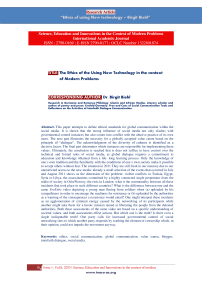The Ethics of the Using New Technology in the context of Modern Problems
Автор: Birgit Biehl
Журнал: Science, Education and Innovations in the Context of Modern Problems @imcra
Статья в выпуске: 1 vol.8, 2025 года.
Бесплатный доступ
This paper attempts to define ethical standards for global communication within the social media. It is shown that the strong influence of social media not only clashes with governmental control instances but also comes into conflict with the abusive practice of its own users. The next part illustrates the necessity for a globally accepted value canon based on the principle of “dialogue”. The acknowledgment of the diversity of cultures is identified as a decisive factor. The final part determines which instances are responsible for implementing these values. Ultimately, the conclusion is reached that is does not suffice to have control over the technical and formal rules of social media, as global dialogue requires a commitment to education and knowledge obtained from a life- long learning process. Only the knowledge of one´s own tradition and the familiarity with the conditions of one´s own society make it possible to accept others without fear. The situation in 2011 They are still fresh in our memory due to our unrestricted access to the new media: already a small selection of the events that occurred in July and August 2011 shows us the dimension of the problem: violent conflicts in Tunisia, Egypt, Syria or Libya, the assassinations committed by a highly connected single perpetrator from the midst of society in Oslo/Norway, the riots in London: what is the commonality between all these incidents that took place in such different countries? What is the difference between one and the same YouTube video depicting a young man fleeing from soldiers when (a) uploaded by his sympathizers in order to encourage the readiness for resistance or (b) uploaded by the authorities as a warning of the consequences a recurrence would entail? One might interpret these incidents as an agglomeration of criminal energy caused by the networking of its participants while another might take them for a heroic mission aimed at liberating the people from the detested authorities. Both these assessments of the same video are based on a specific understanding of societal values, and both assessments effect actions. But which one is the truth? Is there even a single indisputable truth? One party calls for increased governmental control of social networking sites to which another party responds by scathing the element of censorship which, in their opinion, could not impede the movement anyway.
Ethics, social communication, global communication, value canoa, blogger, interfaith dialogue, social media
Короткий адрес: https://sciup.org/16010309
IDR: 16010309 | DOI: 10.56334/sei/8.1.2


